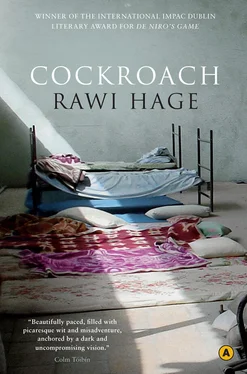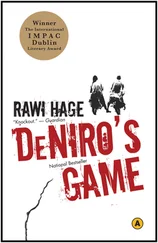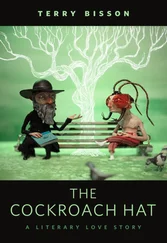I pushed her back into her room and slapped her in return, and the baby wailed.
Joseph Khoury separated us and tried to calm everyone down. My mother just stood there watching as the old man asked me for the gun. Give me the gun, my son, he said to me.
I gave it to him. I’m not sure why. He laid the gun on the table and put his arm around my shoulders. He took me to the balcony and said, Listen, you are a man now. I know that you feel you should protect your family, but violence is not the only way.
Did this man know your father? Genevieve asked me.
He knew about my father.
What about your father? What did he know? No, wait, forget it for now; we’ll talk about that another time. Tell me what happened.
My sister stayed at home. And Tony did not show up again for a while.
You scared him?
No, he just disappeared. No one knew where or why. Even when my sister still lived with him, in his house, he used to disappear every once in a while.
One night I came home late, and as I climbed the stairs I saw my sister coming from above our place down the stairs.
Where were you? I asked her.
Upstairs, she said. And I recognized in her face a look filled with dreams of naked men and desperate plans for liberation, for escape to something calmer, richer.
I went straight upstairs and knocked at Joseph’s door. He opened it with a big smile, expecting someone else, and then I knew. I knew what was going on because he was startled when he saw me. He looked happy, younger and beloved and bouncy, because that is what a caress can do to the old. I looked him in the eye, and I said, If you do not want to be alone, old man, you take care of those who keep you company.
He nodded. He understood.
A few days after that incident, my sister started to work for Joseph in his clothing store.
So, they slept together? Genevieve asked.
What do you think?
Right. And how did you feel about that?
Nothing. I felt nothing.
Nothing?
How are brothers supposed to feel?
Yes, how?
I am asking you, doctor. . Genevieve. How are we supposed to feel?
It depends.
On what? I asked.
Well, what do you think?
I think it depends on class, I said.
Class? Yes, the poor are forced to compromise.
We compromise our loved ones.
Genevieve was silent for a moment. Then she said, You will keep me informed of any future break-ins you’re planning, won’t you?
Why?
Well, it’s something we should talk about.
But will this talk still be confidential?
Yes, it will still be confidential, but also something to assess.
Why?
Because talking about it is part of your treatment.
Because it is exciting, maybe? I said.
For whom?
For Genevieve.
You can leave now, the doctor said. I think we are done for today.
ALL WEEK MY APARTMENT was cold. On Wednesday I went downstairs and knocked at the door of my Indian neighbours. A man opened the door. I asked him if he had any heat.
Very low, very low, he said. This landlord is very cheap, very cheap.
Rather be in India? I asked.
Pakistan, he protested. Pakistan.
I went back to my apartment. A little while later, I had an itch on my back. I hunched over and just reached the itch with a long arm. I scratched it, but it still itched. I went to the kitchen, picked up a wooden spoon, and pushed it down my shirt, parallel to my spine. The spoon was too round, too soft. So I laid it over the edge of the counter and pushed down on it. It broke, and now there was a rougher edge to it. I moved the broken spoon up and down my back until I hurt.
I looked out the window. It was still white outside. Patches of sporadic snow covered the mountain in the distance. It is too cold in this dump, I thought. Maybe if I take a walk outside and move my legs I’ll be able to heat my bones.
But what stressed me more than the cold was hunger. I went back downstairs and knocked again at my Pakistani neighbour’s door. He opened it, and said: May I help you?
I love the smell of your food, I said. I was wondering if you could give me some of your recipes or maybe a little of your food to taste?
Sure, the man said, and smiled. His wife peeked out from the back, covering her head with a silk scarf. And his kids sprang up from the floor and stared at me from behind their mother’s long robe.
You have to buy spices, many spices, the man said. But maybe you like it mild? His wife giggled from the back. His kids struggled to escape through the open door and down the stairs but they were caught by the woman and dragged back inside.
I said: Spices are good; they keep you warm.
My neighbour laughed.
I have not tasted your kind of food yet, I said, but the smell is very good.
The wife covered her teeth with her hand and laughed again.
Wait, the man said. He talked to his wife in another language. She disappeared and came back with a big bowl of food.
Oh, I said. All this for me? Very generous, much obliged, very generous. May the moon light your nights.
Yes. Taste it, and if you like it, you come back and I will tell you the names of the spices and how to make the food.
I went upstairs, sat at my table, and started to eat. Then I ran to fill a glass with water from the tap to extinguish my burning tongue. The food was very hot. It burnt in my nostrils, it made me cry. I felt like getting a little jar, collecting my tears, walking to Genevieve’s office, opening her door, and showing her the bottle. Here — is this what you want? Here — these are my tears. Does that make me sane, normal, cured?
Suddenly the snow outside my window looked appealing. I could go up the mountain, I thought, and lick the white snow to soothe my burning tongue. And while I was at it, I could sniff the yellow traces on the white snow from obedient dogs that are always well-fed.
The food was too hot for me, but it was food — I couldn’t throw it away. I left it on the counter, but not even the roaches, with their massive egalitarian appetites, would approach it. Eventually I thought: What if I dilute it with water and make a soup out of it? Now, there’s an idea. I filled a casserole dish with water, let it boil, and splashed the food into it. The mixture boiled for a while. I let it cool down and then tried to eat it. It was better, so long as I didn’t drink the liquid.
Damn it! I had forgotten to put the socks in the bed again. Well, I thought, what if I boiled the socks and made soup? After all, they smell like blue cheese. Ha ha ha! I started to laugh and I could not stop — something came over me and tears sprang to my eyes again, this time from laughter. I should gather them in little spice bottles, I thought, and label them: tears from laughter, tears from spicy food, tears from pain, tears from nostalgic memories, tears from broken hearts, tears from poverty. The ancient Phoenicians did it. They gathered their tears and buried them underground. Their whole kingdom floated above small glasses of tears before their boats hit the seas. I wondered why all cultures demand tears. The industry of tears! Tears must be seen then buried. Even Genevieve wanted my tears! When a young unmarried man dies back home, the people dance around the coffin singing wedding songs, and that always seems to bring on a lot of tears. Rasha, the first woman I knew, flooded me with tears the first time we slept together. At the time I didn’t know what kind of tears those were. I didn’t ask. We met in my building’s shelter. I kissed her and moved my hips with a charged rhythm. She clung to my hair, and sobbed. Now I know that those were love tears. And now I know that when Tony came back and dragged my sister down the street by her hair, and she left a trail of tears, those were pain tears.
Читать дальше












